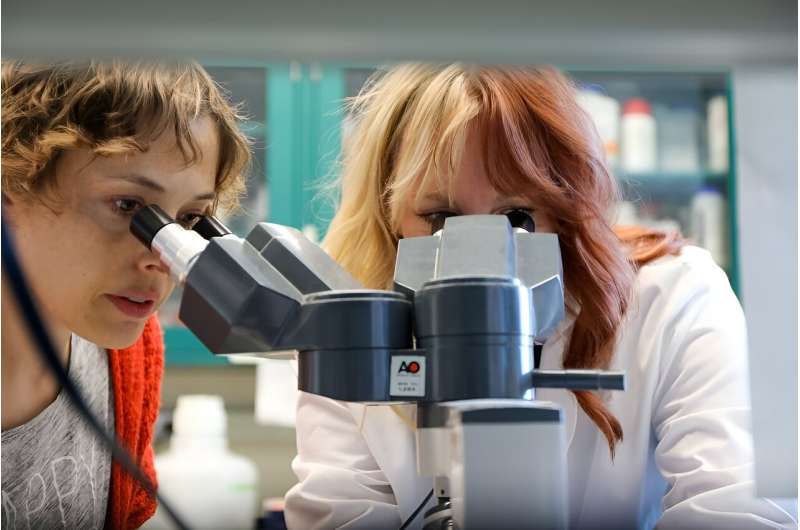This article has been reviewed according to Science X's editorial process and policies. Editors have highlighted the following attributes while ensuring the content's credibility:
fact-checked
peer-reviewed publication
trusted source
proofread
Study identifies biomarker that could lead to better treatment for autoimmune disease

New research that helps explain the molecular processes involved in the painful autoimmune disease ankylosing spondylitis, or AS, may reduce the guessing game that health care providers currently play while attempting to treat the condition.
A team from Oregon Health & Science University and the VA Portland Health Care System has found a specific kind of AS treatment that is effective when used by patients who have a particular genetic mutation. Their study was published today in the journal Annals of the Rheumatic Diseases, and its findings could lead to more targeted, timely and patient-specific treatment recommendations.
"This is the first time research has shown that we might be able to use genetic markers to determine which therapy ankylosing spondylitis patients should receive," said the study's senior researcher, Ruth Napier, Ph.D., assistant professor of molecular microbiology and immunology, arthritis and rheumatic disease in the OHSU School of Medicine, and principal investigator with VA Portland. "These promising findings are encouraging. This is the first time I can say that I'm on the cusp of making a difference for patients with ankylosing spondylitis who seek relief."
Ankylosing spondylitis is a disease thought to affect about 1 in 200 people and involves inflammation of the spine, joints and ligaments that causes pain and stiffness. Severe cases of AS lead some vertebrae to fuse, which reduces spine flexibility and can result in a permanent hunched posture. Symptoms often begin early in life, between the ages of 17 and 45. People with AS often also have other autoimmune conditions like eye inflammation, inflammatory bowel disease and psoriasis.
For most AS patients, the first course of treatment involves taking over-the-counter painkillers such as naproxen or ibuprofen. Next steps can include corticosteroid injections and, in some cases, joint replacement surgery. Another option to stop or slow inflammation is a lab-made, protein-based treatment called a biologic. There are two classes of AS biologics; one is known as IL-17 inhibitors because they target a protein known as interleukin-17, or IL-17.
However, it is currently a guessing game for providers to determine which type of biologic will work well for any given patient. Biologics are only effective about 40% of the time. Having to try a biologic that doesn't work is costly, can lead patients to experience unnecessary side effects, and enables the disease to worsen.
While there is no one single cause for AS, several genes have been linked to the condition. About 72% of people with AS have a particular mutation in their CARD9 gene, which provides instructions for making proteins involved in the body's immune response to invading pathogens. This specific mutation is thought to make the CARD9 gene overreactive, causing immune cells, including neutrophils, to go into overdrive and potentially attack healthy cells.
For this study, the team's first step was to explore AS in research mice used to model autoimmune disease. After removing the CARD9 gene, Napier and colleagues found the genetically modified mice did not get AS and determined that CARD9 drives AS.
Next, the research team focused on blood samples collected from hundreds of people enrolled in the Veterans Affairs Program to Understand the Long-term Outcomes of Spondylarthritis, or PULSAR, patient sample registry. The team found people with mutated CARD9 genes had substantially higher concentrations of the IL-17 protein in their blood compared to those with non-mutated CARD9 genes. These new findings led Napier and colleagues to hypothesize that people with AS who have the CARD9 mutation are those who respond well to IL-17 inhibitor biologics.
The OHSU-VA team is now working with clinicians—including OHSU's Atul Deodhar, M.D., M.R.C.P., and University of Colorado's Liron Caplan, M.D., Ph.D., both of whom are also co-authors on this study—to further explore this in current AS patients. If their continued research confirms their initial results, health care providers could order genetic tests to identify the CARD9 gene mutation in patients.
More information: Holly L Rosenzweig et al, Card9/neutrophil signalling axis promotes IL-17A-mediated ankylosing spondylitis, Annals of the Rheumatic Diseases (2023). DOI: 10.1136/ard-2022-223146


















